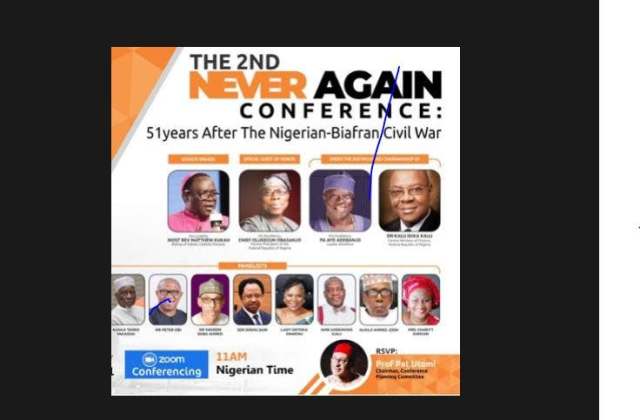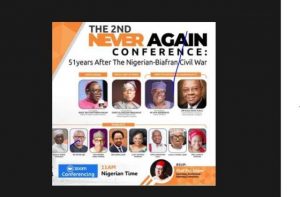In remembering the Nigerian- Biafran Civil War which ended 51 years ago, precisely on January 15, 1970, a host of eminent Nigerians said, yesterday, that the country has learned little or nothing from the deadly misadventure, and could return to same disastrous path if warning signs are ignored.
Prominent Nigerians, drawn from all parts of the country, who shared this view include Elder statesmen Chief Mbazulike Amechi, Chief Ayo Adebanjo and Alhaji Tanko Yakassai, Bishop Matthew Hassan Kukah, Ambassador Godknows Igali, Senator Shehu Sani, Bishop Sunday Onuoha, Mrs Onyeka Onwenu, Ms Annkio Briggs, Mrs Charity Shekari, Mr. Peter Obi, Dr Hakeem Baba-Ahmed, Professor Pat Utomi, Elder Uma Elaizu, and Mazi Nnamdi Kanu.
They spoke at a four-hour zoom parley themed: ”51 Years After the Nigerian-Biafran Civil War, 2nd Never Again Conference” organised by Nzuko Umunna, an Igbo think tank group in partnership with Ovation International and Njenje Media.
Anchored by Mr Dele Momodu and Maazi Ezeoke, the parley elicited deep concerns from participants, who proffered suggestions on how to ensure that Nigeria is fair to all citizens and did not return to the deadly course of war.
Most of the speakers agreed on the need to ensure justice, equity, review of the constitution and the elite joining forces to save the country. They also agreed on the history of the war and the need for it to taught to guide our children.
Nation hasn’t recovered from wounds of civil war —Kukah
Delivering the keynote speech, Matthew Kukah, Bishop of Sokoto Catholic diocese, said Nigeria has not recovered from wounds of the civil war 51 years after because the country failed to adopt resolutions that were meant to heal the wounds of citizens.
Kukah said some of those resolutions came from the Human Rights Violations Investigation Commission popularly known as Oputa panel, which was set up by the former President Olusegun Obasanjo administration.
He also said while the military laid the foundation for Nigerians to begin a process of rebuilding the nation, “things somehow went wrong” along the line.
“I have met a lot of people who fought the war who are full of regrets. There is a lot of resentment, anxiety and frustration that we have not learnt any lessons,” he said.
“Fifty-one years after the war, we are still hearing the kind of agitations that ordinarily, with commitment, dedication, focus and the right leadership, we should have put a lot of the anxieties behind us. Unfortunately, they are still with us.”
The bishop described the Oputa panel, which he was part of as “the best school I would ever hope to attend. Oputa panel managed to generate quite a lot of data and information that academicians and policymakers would have used to ensure we erect the signpost saying, ‘Never Again’, because it gave us an opportunity, a mirror to look at ourselves after hearing from all sides but we didn’t have the discipline to follow through,” he said.
“We have not been able to forgive ourselves as a people. The wounds of the civil war have not been able to heal. Coups and counter-coups that followed were more or less miniature civil wars by themselves because they threw up the same contradictions, anxieties and feeling of divisiveness across the country.”
Civil war lessons ‘ll help us address past mistakes —Utomi
Also, Chairman of the Planning Committee of the conference, Professor Pat Utomi, said the initiative started as an advocacy “in trying to bring a better understanding of the civil war and its aftermath to the Nigerian people”.
According to him, this is being pursued in a way that “it will become a source of energy for bringing a new nation. We know that if people learn enough from errors of yesterday, they can, in fact, make more progress than they are currently making,” he said.
“One of the biggest challenges of nation-building is the kind of trust deficits that exist which make policy implementation very challenging. A better understanding of the civil war will make it become a ladder that people can climb to higher levels of growth,” he added.
Let’s restructure, return to true federalism —Adebanjo
Pa Ayo Adebanjo, who chaired the event said with justice and equity, restructuring and a people’s constitution, Nigeria would overcome most of her current challenges.
Thanking the organisers for the noble objectives, he said: ”I am happy you invited people who took part in the mistakes of the past to this conference. Our problem is not getting solutions but the courage to correct our problems. Let’s go back to where we started before trouble set in.”
Wandering why the South-East is being denied the president, he said: How can we be debating where the presidency should go in 2023? How can people be part of a country they cannot produce the president? We are paying lip service to one Nigeria. We are discriminating against people, putting square pegs in round holes. Let’s stop it if we want to stay together.”
Adebanjo called for a return to the Independence Constitution of 1960 or 1963 Constitution our founding fathers such as Sir Ahmadu Bello, Dr Nnamdi Azikiwe and Chief Obafemi Awolowo agreed to.
This is not the country we founded —Amechi
Chief Mbazulike Amechi, First Republic Minister, who decried the marginalisation of Igbo in Nigeria, said: ”I come from the part of Nigeria that was conquered in the civil war. What I am seeing today is no longer the country we founded” adding that the Igbo want to be part of Nigeria and should be accommodated instead of being chased away and not allowed to go at the same time.
Noting that since the military struck the country has not had a people’s constitution, Amechi said the solution lies in returning to fiscal federalism as we had in the First Republic.
Alhaji Tanko Yakassai, who recalled how what he deemed the largely Igbo coup of 1966 aborted the Nigerian dream and trajectory, how Colonel Chukuemeka Odumegwu-Ojukwu led the East to secede, said 51 years after the war a lot of reconciliation, reconstruction and rehabilitation had taken place and Nigerians are living with one another all over the country. He urged joining of forces to deepen democracy and enthrone an egalitarian society.
He lamented that despite the high level of progress made since the end of the war, there has been continuous call for restructuring and review of the 1999 constitution, insecurity in many parts of the country, agitation for Biafra by IPOB and mistrust among sub-regional groups, adding that we need to learn lessons of the civil war to address the fractional tendencies of today.
Also, speaking, Ambassador Igali said people of the South-South were victims of the civil war as much as the South-East and said we need elite consensus, and collaboration to save the country.
Onyeka Onwenu, Annkio Briggs and Shekari decried poor inclusion of women in the affairs of the country.
Onwenu lamented discrimination against the Igbo and urged the Igbo to think home if they were not wanted in Nigeria.
Annkio Briggs said Nigeria is paying lip service to unity without addressing the injustice against the Niger-Delta, the Igbo and of course restructuring the country.
Leader of the Indigenous People of Biafra, IPOB, Mazi Nnamdi Kanu, caused a stir, when in his contribution said there was no basis for Nigeria’s unity because of inequity, injustice and lack of fair-play. He specifically vilified the Fulani for most of the socio-economic problems in the country.
One of the organisers, Ngozi Odumuko, said they put up the event because they do not want the terrible things that happened during the war to recur. Going forward, he said a joint committee with representatives from all parts of the country would be set up to sustain the engagement and discourse because ”there is no need for any war.”



